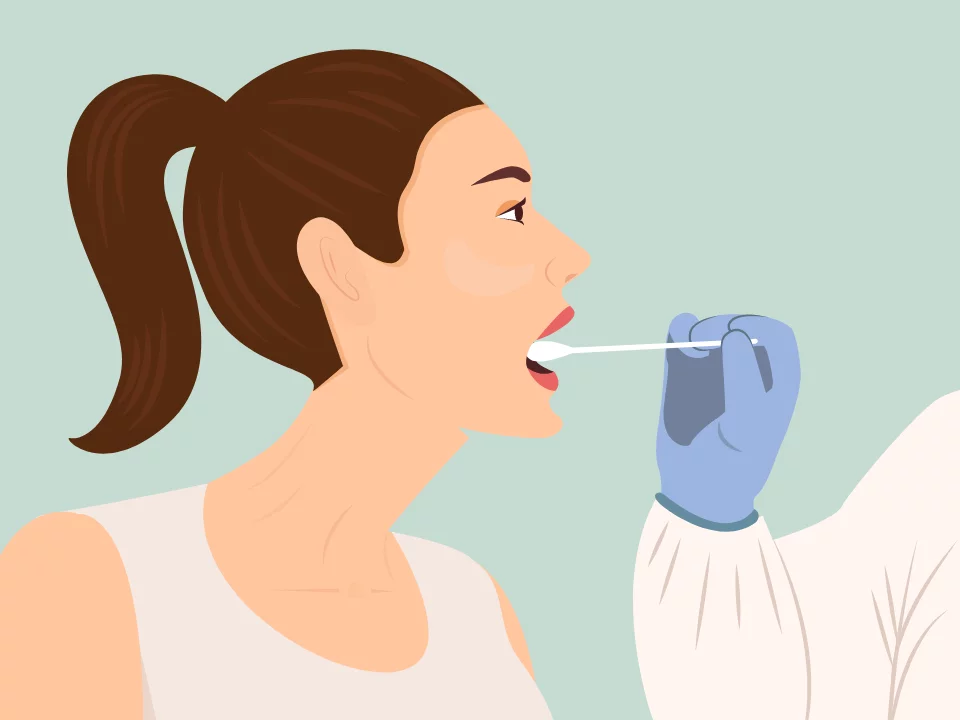Diabetes is not spread through saliva, but the fluid in the oral cavity can actually aid in diagnosing and monitoring diabetes so the harmful complications of this disease never fully develop. Researching the connection between saliva and diabetes through salivary diagnostics, or saliva tests for health issues, is opening up new and innovative ways to diagnose diseases, like periodontitis, in more accessible, less invasive methods. By using saliva instead of blood for testing, patients will be more likely to have the tests done so that disease or the potential for disease can be caught early and possibly be avoided altogether. Studies are being done to find a correlation between salivary and blood glucose levels as well as looking for biomarkers, objective signs indicating your medical state, for a plethora of diseases and conditions, including diabetes.
Diabetes is a disease that affects over 37 million people in the United States alone. According to the Center for Disease Control, diabetic patients suffer from issues with the insulin released by the pancreas, resulting in an inability to transfer sugar in the blood, also called glucose, to the cells where it is needed. The glucose ends up staying in the bloodstream causing high blood sugar, which can lead to a long list of negative effects on the body, including loss of vision, heart disease, kidney disease as well as causing troubling gum disease and oral infections.
What Is Salivary Glucose?
Can diabetes cause salivary gland problems? Saliva is crucial to the health of the mouth by providing antibodies that attack and kill germs. Patients can be diagnosed with salivary gland disorders and even cancer. But low levels of saliva can also be connected to diseases, such as diabetes, that can then result in further complications like gum disease.
How Can Salivary Diagnostics be a Preventative Care for Other Diseases?
What Can Salivary Diagnostics Detect?
- Oral cancers
- Gum disease
- Viral hepatitis
- Breast cancer
- Heart disease
- HIV
- Diabetes
How Diabetes can present itself in your saliva
Does diabetes affect saliva?
Studies have been conducted to see how strong the connection between glucose levels in saliva are compared with the amount of glucose in the blood. With these new studies, research continues to find evidence of significantly higher levels of glucose and lower rates of saliva flow in diabetic patients than in healthy patients. This promising research is paving the way for salivary diagnostics which are much more preferable than the more invasive blood testing that is currently the norm.
How Your Dentist can Diagnose Diabetes
Can Salivary Testing Now Help Save You Money in the Long Run?
Early testing means avoiding treatment for complications caused by diabetes. With $1 in $4 of health care costs in the United States being spent on diabetic care, making it the most expensive chronic disease, the amount of money saved through more regular, less invasive salivary testing will be extremely significant.
Dental Medical Integration with Salivary Diagnostics
Ask your Dentist for a salivary test
Salivary diagnostics can help your dentist diagnose or rule out diabetes. Making your trusted local dentist aware that you are interested in a saliva test can help you get the care you need to keep your body and mouth healthy. If you need a dentist, Smile Generation has a Find A Dentist tool to help you find an experienced dentist in your community.
Find your trusted, local dentist today!
Sources
"A Snapshot: Diabetes in the United States." CDC, 18 Feb. 2020, https://www.cdc.gov/diabetes/communication-resources/diabetes-statistics.html
"Cost Effectiveness of Diabetes Intervention." CDC, 7 Mar. 2022, https://www.cdc.gov/chronicdisease/programs-impact/pop/diabetes.htm
Gupta, Shreya, Meghan and T Nayak, JD Sunitha, Geetanshu Dawar, Hidhi Sinha, and Heelakshi Singh Rallan. "Correlation of Salivary Glucose Level With Blood Glucose Level in Diabetes Mellitus." Sep, 2017, https://www.ncbi.nlm.nih.gov/pmc/articles/PMC5763852/#:~:text=This%20study%20reveals%20that%20salivary,in%20early%20diagnosis%20for%20DM
Mata, Antonio D., Duarte Marques, Sara Rocha, Helena Francisco, Carolina Santos, Maria F. Mequita, and Jaipaul Singh. 2004, "Effects of Diabetes Mellitus on Salivary Secretions and its Composition in The Human." https://pubmed.ncbi.nlm.nih.gov/15362496/
"Oral DNA: Saliva Testing for Periodontal Disease." Charles Schof DDS, 2 Apr. 2022, https://www.charlesschof.com/blog/oral-dna-saliva-testing-for-periodontal-disease
Pacific Dental Services, 2 Apr. 2022, https://www.pacificdentalservices.com/
"Saliva." Mouth Healthy, 31 Mar. 2022, https://www.mouthhealthy.org/en/az-topics/s/saliva
Smile Generation blog articles are reviewed by a licensed dental professional before publishing. However, we present this information for educational purposes only with the intent to promote readers’ understanding of oral health and oral healthcare treatment options and technology. We do not intend for our blog content to substitute for professional dental care and clinical advice, diagnosis, or treatment planning provided by a licensed dental professional. Smile Generation always recommends seeking the advice of a dentist, physician, or other licensed healthcare professional for a dental or medical condition or treatment.





.png)


